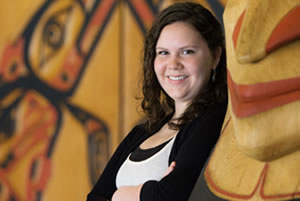 Miranda Kelly doesn’t shy away from talking about her Aboriginal heritage—and modern day issues affecting the health of Aboriginal people.
Miranda Kelly doesn’t shy away from talking about her Aboriginal heritage—and modern day issues affecting the health of Aboriginal people.
But the graduate from the School of Population and Public Health’s Master of Public Health program says it would be a mistake to assume all Aboriginal people are the same and face the same challenges.
“There’s great diversity in Aboriginal peoples and today’s generation is more interested in making connections amongst different cultures,” says Kelly, a member of the Sto:lo Nation’s Soowahlie Band in Chilliwack.
“Whether it’s simple misunderstanding over terminology—what’s the difference between native, Aboriginal and First Nations?—or more complex issues such as addiction and health care governance, we’re more willing to say ‘I don’t know, but I’m willing to learn.’”
Kelly says the highlight of her UBC education was a practicum in the Northwest Territories, where she was instrumental in keeping a homeless shelter open.
“Nobody wants to see people sleeping on the street, especially in such an extreme climate. But within the confines of individual agencies, there was only so much they could do alone,” says Kelly, who worked with the Inuvik Interagency Committee to identify potential long-term funding models while keeping the shelter in operation.
The experience cemented her passion for a career in health care policy and governance at a time when multiple levels of government are discussing the transfer of health care to First Nations.
“It comes down to equity—Aboriginal people have the right to the same level of health care that other populations in Canada receive—while respecting their diversity and culture,” says Kelly, who adds that symbolic “consultations” must give way to decision-making authority by First Nations communities.
If Kelly sounds like a natural-born leader, she takes after her father, Grand Chief Doug Kelly, Chair of the First Nations Health Council and an executive of the First Nations Summit.
“I’ve learned a lot from him about striking a balance between the traditional First Nations lifestyle and modern society,” she says. “He has inspired me to draw strengths from my ancestry while making the most out of my education to build a fulfilling career that will also benefit my community.”